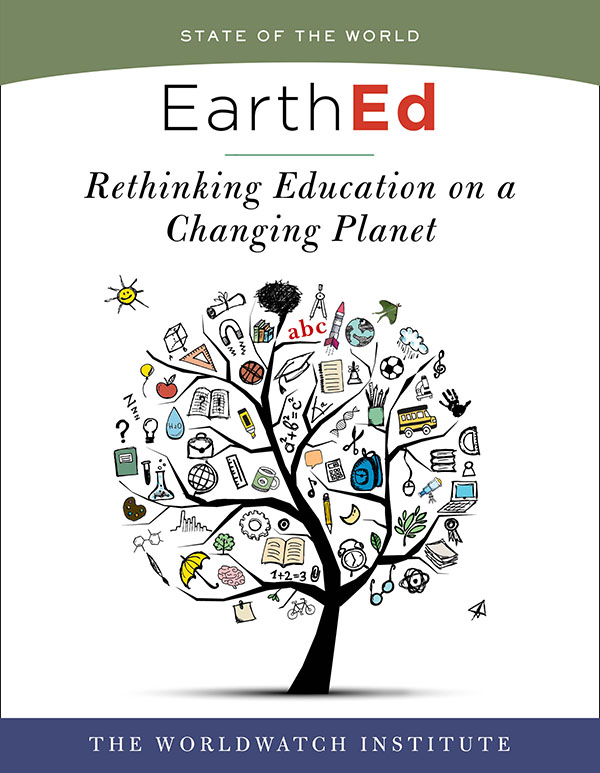BOONE, N.C.—How do educators prepare the world’s population for the predicted collateral damage of climate change over the course of this century: emerging diseases, food shortages, drought and waterlogged cities?
Find out at the launch of the Worldwatch Institute’s 2017 State of the World report, “Rethinking Education on a Changing Planet,” hosted by Appalachian State University.
This full-day event, consisting of short, TED-style talks and panel discussions, is open to the public at the Schaefer Center for the Performing Arts on Rivers Street Thursday, April 20, from 9 a.m.- 4.p.m. Participants are free to come and go throughout the day.
“Rethinking Education on a Changing Planet” will bring perspectives from more than 50 education experts from around the world. The report addresses schooling at all levels of development, from preschool to professional. Teachers, policy makers, school administrators, community leaders, parents and students are encouraged to attend.
Appalachian is partnering with the Worldwatch Institute on a number of projects and was selected by WorldWatch as the university to launch its 2017 report. Sustainability Director Dr. Lee Ball said content for this event is more strategic than topics like ecoliteracy, outdoor education and environmental science – standards in eco-education seminars.
“The coming century is on track to be the warmest in human history and every aspect of human life will be affected,” he said. “We must prepare our educators to be agents of change and leaders for a sustainable future. That’s what this event is about.”
Ball and Vice Provost for Faculty Affairs Dr. Sue Edwards will kick off the morning session, “EarthEd Fundamentals,” and introduce the Worldwatch Institute President Ed Groark.
Over the course of the day, a diverse group of education experts will share approaches to teaching and learning in an era presenting new challenges. Topics may include systems thinking for children; the importance of play in early education; social emotional learning; comprehensive sexuality education; indigenous knowledge; sustainable business; medical training to treat the whole person; teaching law in the Anthropocene; and more.
Videos from satellite events will be screened during the lunch break. The afternoon session from 1- 4 p.m. is “Higher Education Reimagined.”
Speakers include:
- Erik Assadourian, a senior fellow at the Worldwatch Institute and director of State of the World 2017 and Worldwatch’s EarthEd Project
- Michael K. Stone, senior editor at the Center for Ecoliteracy, coeditor of “Ecological Literacy: Educating Our Children for a Sustainable Future” (Sierra Club Books), author of “Smart by Nature: Schooling for Sustainability” (Watershed Media), and winner of the Green Prize for Sustainable Literature
- Pamela Barker, an educational consultant in social and emotional learning and restorative practices in Fort Collins, Colorado
- Amy McConnell Franklin, director of social emotional learning and mindfulness at United World College in Thailand
- Robert Engelman, a senior fellow and former president of the Worldwatch Institute and director of the institute’s Family Planning and Environmental Sustainability Assessment project
- Michael Maniates (video presentation), professor of environmental studies at Yale-NUS College, Singapore
- Joshua Farley, an ecological economist, professor in community development and applied economics, fellow at the Gund Institute for Ecological Economics at the University of Vermont, special visiting researcher at the Universidade Federal de Santa Catarina in Brazil and co-author with Herman Daly of the first textbook in ecological economics
- Laura Lengnick, former director of sustainability at Warren Wilson College, a soil scientist and climate resilience consultant with Cultivating Resilience, LLC, Asheville, and author of “Resilient Agriculture: Cultivating Food Systems for a Changing Climate” (2015)
- Joslyn Rose Trivett, education and outreach manager at the Sustainability in Prisons Project (SPP)
Panelists from Appalachian include Dr. Vachel Miller, associate professor in the Department of Leadership and Educational Studies in the Reich College of Education, interim director for the doctoral program (2013-15) and a Fulbright Scholar at Bahir Dar University, Ethiopia (2015-16); Dr. Richard D. Rheingans, chair of the Goodnight Family Department of Sustainable Development; and Ball.
View a complete schedule at https://sustain.appstate.edu/events/id/rethinking-a-changing-planet-worldwatch-2017
About Worldwatch
Through research and outreach that inspire action, the Worldwatch Institute works to accelerate the transition to a sustainable world that meets human needs. The Institute’s top mission objectives are universal access to renewable energy and nutritious food, expansion of environmentally sound jobs and development, transformation of cultures from consumerism to sustainability, and an early end to population growth through healthy and intentional childbearing.
About the Office of Sustainability
Appalachian State University’s leadership in sustainability is known nationally. The university’s holistic, three-branched approach considers sustainability economically, environmentally and equitably in relationship to the planet’s co-inhabitants. The university is an active steward of the state’s interconnected financial, cultural and natural resources and challenges students and others think critically and creatively about sustainability and what it means from the smallest individual action to the most broad-based applications. The university offers both undergraduate and graduate academic degree programs that focus on sustainability. In addition, 100 percent of Appalachian’s academic departments offer at least one sustainability course or course that includes sustainability, and all students graduate from programs that have adopted at least one sustainability learning outcome.
About Appalachian State University
As a premier public institution, Appalachian State University prepares students to lead purposeful lives. App State is one of 17 campuses in the University of North Carolina System, with a national reputation for innovative teaching and opening access to a high-quality, cost-effective education. The university enrolls more than 21,000 students, has a low student-to-faculty ratio and offers more than 150 undergraduate and 80 graduate majors at its Boone and Hickory campuses and through App State Online. Learn more at https://www.appstate.edu.
What do you think?
Share your feedback on this story.




![How NCInnovation Is Rethinking Economic Development in North Carolina [faculty featured]](/_images/_posts/2026/02/rethinking-economic-development-600x400.jpg)







